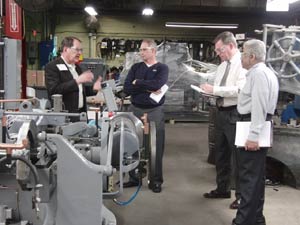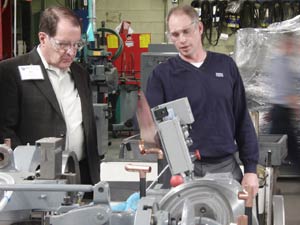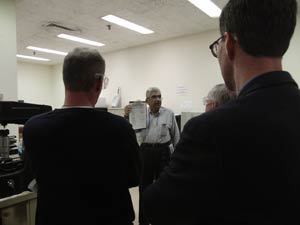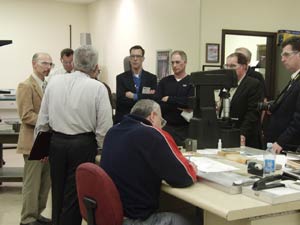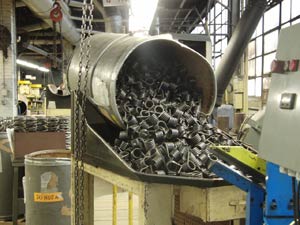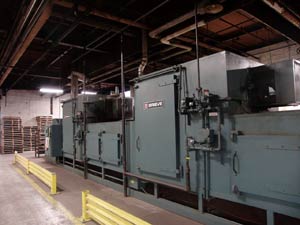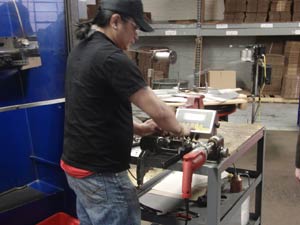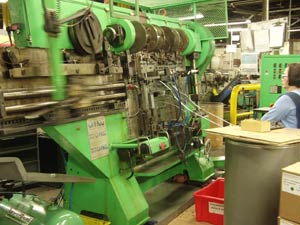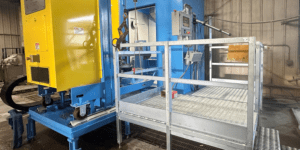SPRING FORWARD
It all began with two four-slide machines for springforming. But how does seemingly traditional Dudek & Bock Spring Manufacturing, operating inside an urban metropolitan city, sustain its leadership role in the world market after 65 years in business?
Posted: December 30, 2011
Dudek & Bock Spring Manufacturing Company (Chicago, IL) is a longtime world leader in springs, wireforms and light metal stampings for the automotive, appliance, housewares and other major high-volume, close tolerance markets. How does this seemingly traditional metalforming company, operating in a major metropolitan city, sustain its leadership role in the world market after 65 years in business?
A plant tour of this business answers far more than that question . . . it is nothing less than an object lesson for teaching other manufacturers ways to improve their own operations.
The tour begins with a presentation by Matt Puz, the vice president of sales and marketing who, along with Mike Dudek and Raquel Chole, heads up the sales operations for Dudek & Bock, which operates plants in Chicago and Saltillo, Mexico. The presentation recaps the history of the company from its humble beginnings in 1946, when Mike Dudek’s grandfather Joe and his partner Stan Bock started the business with two four-slide machines for springforming.
Their commitment to vertically integrated manufacturing, product quality and efficient operation of the factory was then and still is the envy of the industry. Dudek & Bock today maintains over 500 machines for use at both plants, retrofitting and rebuilding them in their Chicago factory, plus the company produces over 90 percent of its own tooling to minimize reliance on outside sources and the attendant cost/delivery issues. The company currently produces over 1500 products to order.
Puz details the precision with which the operations of both plants are monitored, both in terms of employee productivity and machine utilization. Karen Pacana, one of the company account managers, addresses the scheduling of raw material purchases and shipping strategies, while Ken Kveton, part of the business development team, speaks on the constant oversight exercised at Dudek & Bock to insure lower PPM and to streamline business integration between the two plants.
Dudek & Bock recently purchased another supplier to the automotive industry and melded the operation into its Chicago plant. That company concentrated on the automotive seating sector where Dudek & Bock was already established. As Mike Dudek observes, “We saw an opportunity to expand our product reach in the seating business, not only with the in-house capabilities we already had . . . but also through this compatible company that was making torsion springs and related products. The acquisition went smoothly and we are quite pleased with the results to date.”
Matt Puz notes that, collectively, the automotive and appliance business represent 80 percent of the gross revenue at Dudek & Bock. He observes that selling to these high-volume, critical dimension industries is very challenging. “For several years recently, we invested over $1 million annually in new CNC equipment to better serve our customers, through increased automation and capacity utilization at both our plants.”
Karen Pacana adds that, “While some products are produced in the Mexico plant for local automotive business, most of it happens here in Chicago, affording us optimum control of the manufacturing and logistics. This reduces carrying costs and allows us to build a safety overrun into our jobs, which frequently gets used for aftermarket repair operations.”
Complementing the core competencies of spring, wireform and light metal stamping production at Dudek & Bock, the company also maximizes its value to customers by providing a number of secondary operations on products, including welding, riveting, inline tapping and extrusion plus drilling, swedging, grinding, tapping, deburring, stress relief, shot peening, degreasing, some coating and oven curing, plus specialized packaging to suit customer requirements.
Raquel Chole notes that the employees from the Mexico plant, nearly all young and well educated, are frequently brought to Chicago for machine cross-training and instruction on the protocols used by the company for production evaluation. “This policy gives the employees a great sense of belonging to our organization and company culture, plus they come away from the experience here with multiple skill sets that can be utilized at the Saltillo facility.”
Eipe Varghese, the vice president for quality, proudly discusses how the company has achieved ISO 9001, ISO 14001 and ISO/TS 16949 certification. “Our full audit procedures and constant attention to continuous improvement protocols at both plants have made a big difference in the overall efficiency of the company. This reduces cost, improves delivery achievements and keeps us a valued supplier to our demanding major markets.”
Puz concludes his presentation with a detailed discussion on the “cost of quality” at Dudek & Bock. “We utilize world-class metrics to keep us a world-class company,” he says with no small amount of pride. “Quality has become part of our culture here. We review everything related to our machines, labor, overtime, earned hour ratio and more.” The result has been an outstanding 25 percent higher efficiency for man-hours worked over the last eight years.
The company is committed to a “design for manufacturability” strategy that utilizes an Advanced Production Quality Planning (APQP) process to make optimum use of the machinery and secondary operations in-house to produce products to specification and in the most efficient manner possible, explains Puz.
Following the presentation is a full tour of the Chicago plant, where Mike Dudek explains the Value Analysis/Value Engineering (VA/VE) concept that drives a key component of the company’s continuous improvement policy. “We frequently take a product that’s been made a certain way and, by using our production equipment and secondary operation skills, we are able to remove weight and improve the manufacturability of the product, without compromising the performance or quality in any way.”
Puz also notes that, as a supplier to the automotive industry, safety factors in the end product are constantly monitored. “We sample all our products throughout the run, including on every new spool of wire or coil of metal. This is a further back-up to what our quality department does on all incoming shipments.”
Raquel Chole observes that the monitoring of total production and all incoming jobs is done at biweekly staff meetings where company managers review the performance issues of all machinery at both plants, plus perform an assessment on the incoming workflow. Energy use, IT issues, capacity utilization, “stretch opportunities” within an existing customer or market, and manufactured product potential are all evaluated in an ongoing manner through this process.
Eipe Varghese conducts the tour of his quality department, detailing how PPAP and segment checks are performed on all jobs at Dudek & Bock, sometimes in compliance with customer mandate, but more often to the stringent internal protocols established long ago by the company itself. “We perform load testing, full data capture and record keeping on all the work cells in the plant.” He notes that the Mexico facility has a mirror image quality lab. “Gaging is often built in-house, but we use external calibration services as well, to be sure we’re on track at all times.”
While touring the machine maintenance department, Mike Dudek muses that “this is our old-fashioned art department, our black magic, if you will.” The department is staffed with many longtime Dudek & Bock employees who have not only run every piece of machinery in the building, but are able to repair and retrofit it, as well. On a typical piece of heavy wireforming machinery, Dudek notes, “. . . you might be looking at $300,000 to buy it new, while our guys can make one of our old machines run as good as new for maybe 20 percent of that amount. Big difference.”
Editor’s Note: Many thanks to Tim Daro of Bernard & Co. and Bob Vavra of Plant Engineering magazine for providing this story from the Manufacturing Summit held in Chicago earlier this year.
Dudek & Bock Spring Manufacturing Company, 5100 W. Roosevelt Road, Chicago, IL 60644, 773-379-4100, Fax: 773-379-4108, [email protected], www.dudek-bock.com.





